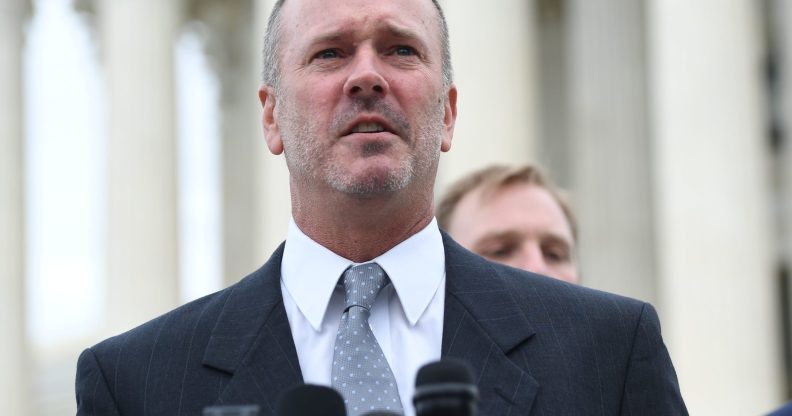Sole surviving plaintiff at the centre of the Supreme Court’s seismic LGBT+ ruling warns there’s still ‘a long way to go’

Gerald Bostock speaks to demonstrators in favour of LGBTQ+ rights at a rally outside the US Supreme Court in 2019. (AFP via Getty/ SAUL LOEB)
Supreme Court plaintiff Gerald Bostock has spoken about the impact of the court’s seismic decision to enact LGBT+ employment protections in all 50 states.
Three plaintiffs were at the centre of the case decided by the Supreme Court last week, but Bostock is the only one who is still alive, following the tragic deaths of Aimee Stephens and Donald Zarda.
All three faced discrimination at work because of their sexual orientation and gender identity. In 2013, Bostock was fired from his job as a child social services coordinator in Clayton County, Georgia when his boss discovered he had joined a gay softball league.
Gerald Bostock: ‘The fight became bigger than I could ever have imagined’.
In a CBS segment on June 21, Bostock explained of what happened to him: “I was in a dream job. I loved working on behalf of underserved children in Clayton County, Georgia, near Atlanta. For 10 years I had a glowing record. And then, I joined a gay softball league to work on my health after beating prostate cancer.
“That’s when things changed. Within six months, I was fired. I lost my job, and my medical insurance, while in recovery after my cancer treatment.
“My story is just one of so many stories. So many others have lived in fear of being their true selves at work.
“But along with my fellow plaintiffs in this case — Aimee Stephens and Don Zarda, may you now rest in peace — I fought back. And that fight became so much bigger than anything I could have imagined.”
Supreme Court LGBT+ plaintiff warns there’s still a long way to go to stamp out discrimination.
He continued: “This past week we won. Our nation’s highest court held that an employer who fires a person for being gay or transgender defies the law.
“Now, no one has to go to work fearing they’ll lose their job because of who they are or who they love.
“Thank you to the Supreme Court for recognising basic human rights, and sending a clear signal that we should treat each other with dignity and respect.
“We still have a long way to go to stamp out discrimination. Recent events underscore the injustices in our society, and remind us that we have to work harder.
“Discrimination, of any kind, has no place in this world. I hope this decision provides hope to LGBTQ people everywhere. To all those who work to uphold and support our civil rights, thank you.”
In an interview with Outsports, Bostock said of his plans for the future: “I want to lend my voice to efforts to end all inequality, and really continue to push equality forward.
“Here in Georgia, we don’t even have a hate crime law yet. We need those things. There’s a lot of work to be done, and this journey for me has not ended yet. We’ve just started a new chapter.”

